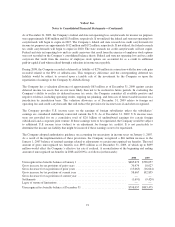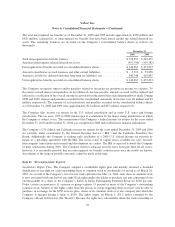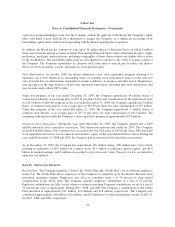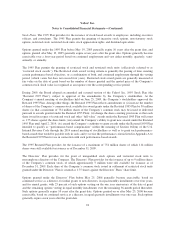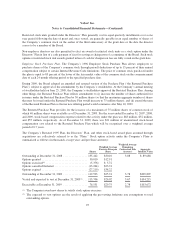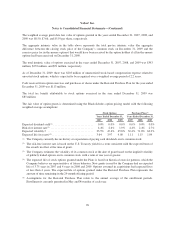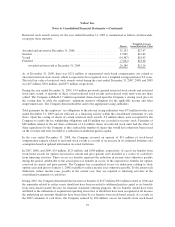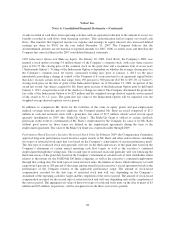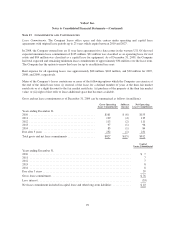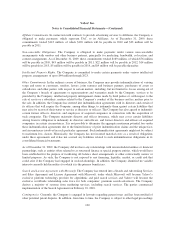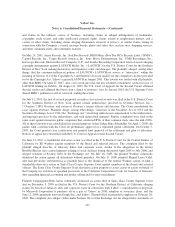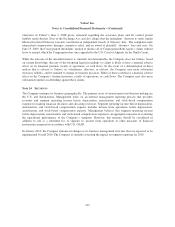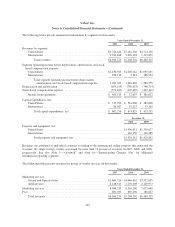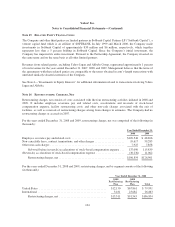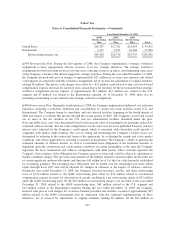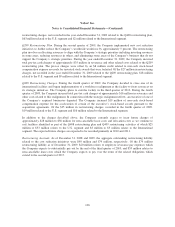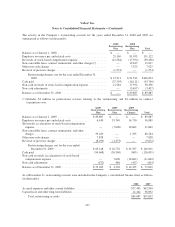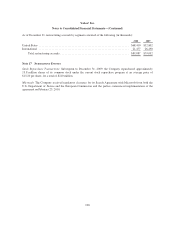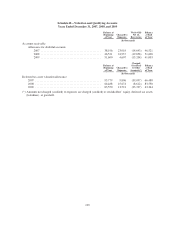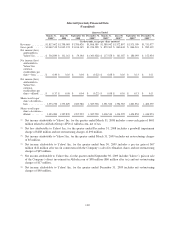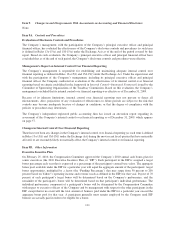Yahoo 2009 Annual Report Download - page 109
Download and view the complete annual report
Please find page 109 of the 2009 Yahoo annual report below. You can navigate through the pages in the report by either clicking on the pages listed below, or by using the keyword search tool below to find specific information within the annual report.Yahoo! Inc.
Notes to Consolidated Financial Statements—(Continued)
and claims in the ordinary course of business, including claims of alleged infringement of trademarks,
copyrights, trade secrets, and other intellectual property rights, claims related to employment matters, and a
variety of other claims, including claims alleging defamation, invasion of privacy, or similar claims arising in
connection with the Company’s e-mail, message boards, photo and video sites, auction sites, shopping services,
and other communications and community features.
On May 24, 2001, Arista Records, Inc., Bad Boy Records, BMG Music d/b/a The RCA Records Label (“BMG”),
Capitol Records, Inc., Virgin Records America, Inc., Sony Music Entertainment, Inc., UMG Recordings, Inc.,
Interscope Records, Motown Record Company, L.P., and Zomba Recording Corporation filed a lawsuit alleging
copyright infringement against LAUNCH Media, Inc. (“LAUNCH”) in the U.S. District Court for the Southern
District of New York seeking declaratory and injunctive relief and damages. The plaintiffs alleged, among other
things, that the consumer-influenced portion of LAUNCH’s LAUNCHcast service is “interactive” within the
meaning of Section 114 of the Copyright Act and therefore does not qualify for the compulsory license provided
for by the Copyright Act. Yahoo! acquired LAUNCH in August 2001. This lawsuit was settled with all plaintiffs,
other than BMG. On April 27, 2007, after a two week jury trial, the jury returned a unanimous verdict in favor of
LAUNCH finding no liability. On August 21, 2009, the U.S. Court of Appeals for the Second Circuit affirmed
the trial verdict and affirmed the lower court’s denial of attorneys’ fees. In January 2010, the U.S. Supreme Court
denied BMG’s petition for writ of certiorari, ending the action.
On July 12, 2001, the first of several purported securities class action lawsuits was filed in the U.S. District Court
for the Southern District of New York against certain underwriters involved in Overture Services Inc.’s
(“Overture”) IPO, Overture, and certain of Overture’s former officers and directors. The Court consolidated the
cases against Overture. Plaintiffs allege, among other things, violations of the Securities Act of 1933 and the
Securities Exchange Act of 1934 (the “Exchange Act”) involving undisclosed compensation to the underwriters,
and improper practices by the underwriters, and seek unspecified damages. Similar complaints were filed in the
same court against numerous public companies that conducted IPOs of their common stock since the mid-1990s.
All of these lawsuits were consolidated for pretrial purposes before Judge Shira Scheindlin. On April 1, 2009, the
parties filed a motion with the Court for preliminary approval of a stipulated global settlement. On October 5,
2009, the Court granted class certification and granted final approval of the settlement and plan of allocation.
Notices of appeal have been filed with the U.S. Court of Appeals for the Second Circuit.
On June 14, 2007, a stockholder derivative action was filed in the U.S. District Court for the Central District of
California by Jill Watkins against members of the Board and selected officers. The complaint filed by the
plaintiff alleged breaches of fiduciary duties and corporate waste, similar to the allegations in the former
Brodsky/Hacker class action litigation relating to stock declines during the period April 2004 to July 2006, and
alleged violation of Section 10(b) of the Exchange Act. On July 16, 2009, the plaintiff Watkins voluntarily
dismissed the action against all defendants without prejudice. On July 17, 2009, plaintiff Miguel Leyte-Vidal,
who had previously substituted in as plaintiff prior to the dismissal of the federal Watkins action, re-filed a
shareholder derivative action in Santa Clara County Superior Court against members of the Board and selected
officers. The Santa Clara County Superior Court derivative action purports to assert causes of action on behalf of
the Company for violation of specified provisions of the California Corporations Code, for breaches of fiduciary
duty regarding financial accounting and insider selling and for unjust enrichment.
Plaintiff Congregation Beth Aaron voluntarily dismissed an action filed in Santa Clara County Superior Court
and on December 3, 2008 re-filed in the U.S. District Court for the Northern District of California alleging
claims for breach of fiduciary duty and corporate waste in connection with Yahoo!’s consideration of proposals
by Microsoft Corporation to purchase all or a part of Yahoo! in 2008, adoption of severance plans, and the
June 12, 2008 agreement between Google Inc. and Yahoo!. Plaintiff filed an amended complaint on February 20,
2009. The complaint also alleges claims under Section 14(a) of the Exchange Act for alleged false statements or
101


